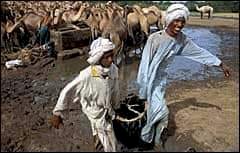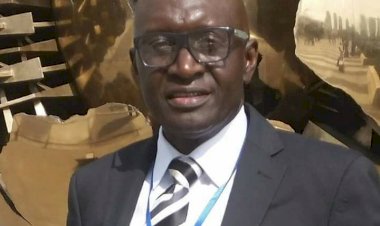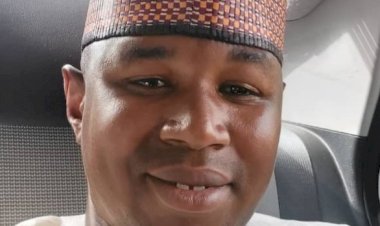FULANI, VILLAINS OR VICTIMS - 6

WHAT THE JIHADS DID NOT DO
From what we have seen, it is clear the jihad movements were largely successful in their aims of purifying Islam from local believes and practices and of founding new societies in Guinea, Guinea Bissau, Senegal, Gambia and along the border with Mauritania. The Jihad was equally successful in Sokoto caliphate stretching from modern day Burkina Faso to Cameroon and in parts of northern Nigeria and in Masina, now in the Mopti Region of present day Mali.
The Jihad was not successful but also a blessing. Fulani aristocracy that replaced the Hausa aristocracy lost its language and culture, a phenomenon that created ‘Hausa-Fulani’, a tribe unique to Nigeria that united an otherwise different peoples. As Hausa language is taught in schools and is preached with in churches and mosques, the Jihad has increased the numerical strength of Hausa speakers and widened the area the language is spoken. This makes Hausa it a factor in promoting the unity of Nigeria.
To this extent the Fulani can not be said to be villains for it was the Fulani Jihad conquest of Hausa land and other parts of the North that brought diverse ethnic and linguistic groups into a single entity that the British created and called Northern Nigeria. In addition, it is because Hausa was widely spoken that the British made it the official language of Northern Nigeria in 1951 until 1967 when the military abandoned the policy. Nevertheless Hausa as a common language had solidified the much needed unity of Northern Nigeria and indeed the nation at large.
However, there was what the Jihad failed to do that made some Fulani understandably villains. To appreciate this point, we must understand two (2) things about the Fulani as follows -:
A. Fulani can be categorised either according to land of their settlement (jolle mabbe) or where they came from; or they may be categorised according to the type of livestock they own (maral mabbe). In recognising a Fulani from his settlement or where he comes from, the Fulani may be a ‘Torodo’ (Torodbe;plural) referred to as ‘Toronkawa’ (in Hausa) to denote that he is from Fouta Toro.
There are ‘Fulbe Masina’ indicating they came from there, just as there are ‘Jallonko’en’ denoting that they are from Fouta D’jalon. Here in Nigeria, we have ‘Dauranko’en’ from Daura, ‘Katsinanko’en’ from Katsina or ’Jafunu’en’ from Jahun, etc. It’s like referring to a Hausa man as ‘Ba Kano’, ‘Ba Dauri’, ‘Ba ‘Sakkwace’, etc.
B. Fulani may also be categorised according to ‘maral mabbe’ or the type of livestock they own. In this respect you may have Fulani ‘Uda’en’ who own ‘Udaji’, Fulani ‘Mbororo’ who our own ‘Mbororo ji’, Fulani ‘Bokolo’ who own ‘Bokoloji’, Fulani ‘Daneji’ who own ‘na’i Daneji’, etc.
However, there is a second broader classification that typified the Fulani into two types. These are -
1. ‘Fulbe Wuro’ or the town dwelling Fulani’; and,
2. ‘Fulbe ladde’, the nomadic Fulani or bush Fulani.
The town Fulani are sedentary and were generally ‘Modib’en’ or ‘jangobe,’ that is the elite class of Fulani. They are members of the learned or ‘aristocratic’ class who held high positions of office or rank as advisers, Imams, judges, commanders of army, etc. Usman Dan Fodio is of Torodbe Fulani which is the elite Fulani class.
The nomadic tribes of Fulani on the other hand identify more with their livestock and have never identified themselves with town dwelling Fulani. The town dwelling Fulani call them ‘fulbe ladde’ or bush Fulani or simply ‘Mbororo’ whether they are Mbororo or not. The Bush Fulani has no relationship with the elite Fulani or Modib’en.
In fact during the Jihad, the bush Fulani were used mainly for what they were known for - warfare. They were never given education by the Fulani ‘Modib’en who used them as soldiers just like the Hausa peasantry.
Even today, no government ever cared about giving them education until in 1989 that the federal government established the National Commission for Nomadic Education (NCNE) and charged it with the implementation of the Nomadic Education Programme (NEP). The program has not worked to satisfaction because we have either embezzled the money for it, or we take decisions in Abuja on behalf of the bush Fulani who live in the bush and without their consent or approval.
Most of us do not know that the only time a nomadic Fulani stays in town or a village is when he has no cattle to tender. Sei to ‘na’i mako timmi, o jodo dole’. The nomads do not own land till today. They only pay tribute or grazing tax to Fulani aristocrats in whose lands they graze their cattle but owing allegiance to none, and moving from territory to territory, at will, throughout West Africa, from the upper reaches of the Senegal river to lake Chad.
The nomadic class of Fulani that we all despise and refuse to give education care only for their herds and flocks; they hold themselves aloof from other races, retaining their full racial characteristics and customs. They are herdsmen who cared little for religion and nothing for power.
.
These are the class of Fulani who we refused and/or failed to integrate into our communities. They are at best nominal Muslims. We fight and kill them or they kill us for allowing their cattle graze our farms. Because we do not care about them as we take our children to school and forget theirs, we sleep in air condition houses while they sleep in ‘bukkaji’, they barricade Abuja-Kaduna road and kill, maim, rob and kidnap.
By Sadiq Ibrahim Dasin
TO BE CONCLUDED TOMORROW...


















































